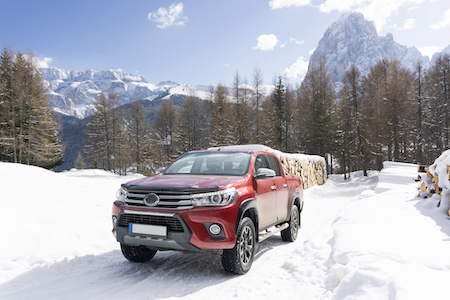Have you ever watched shows on television that show people navigating treacherous winter conditions without a problem, laughing and talking as if nothing were happening outside the window?
You know it’s not reality. Even a few snowflakes can set off a chain of events. The driver in front of you swerves. You hit a patch of ice. You grip the steering wheel as if your life depends on it. There has to be a better way!
Does your truck need winter tires? Will that solve the problem? Are they worth the money, or should you just look for a job closer to home?
When there’s snow, you have to plan for snow
Living in Denver means you’ll get plenty of opportunities to drive in snowy conditions. Just this past year was one of the snowiest years on record, with Denver receiving more snow than it had seen in 37 years.
Even just an inch or two can have a dire effect on your daily commute. Ice can form. Snow can accumulate. And all of it impacts your truck’s traction and handling, creating more risk for you to fishtail, skid, slide, and bump into the cars around you.
Not surprisingly, 24 percent of weather-related crashes occur when pavement is slushy, icy, or snowy. Almost 15 percent occur when snow or sleet is falling. Waking up and taking a peek out the window can immediately put you on alert – you’ll face a stressful drive. Is there a way to change that?
The answer may be with winter tires
No matter what type of vehicle you drive – truck, 4×4, SUV – your tires are the source for your wintertime stopping power and performance. Tires give you cornering grip. They give you the ability to effectively turn and recover if the tire slips and slides.
While trucks often have a unique ability for traction and safety, that can change rapidly when the snow starts to fall.
Unlike regular tires, winter tires are created with rubber that won’t harden as the temperatures drop. The tread of winter truck tires remains flexible no matter how far the temperatures drop, enabling them to better grip icy and snow-packed roads.
Winter tires also have specially designed tread patterns that cut through the layers of wintery roads. They handle precipitation more effectively, and are designed to keep your vehicle on track and driving straight no matter how bad the roads get. They provide full-depth tread that better pushes away snow and sleet to improve how it handles on the road.
Snow tires or chains – what’s the difference?
Even if you have snow tires, you may occasionally see recommendations for adding tire chains if you’re going to drive. If you’re going to carry tire chains and plan on using them when the roads are bad, is it really necessary to invest in snow tires too?
Think of tire chains as a cheap alternative to snow tires. They give you much-needed traction when you need it most. But unlike snow tires, they aren’t there at the spur of the moment, when things rapidly change. And if you’ve been in Colorado long enough, you know weather can move into the city in moments. With tire chains, you’ll be out of your truck, putting them into place, and spending time outside as the weather worsens. You have to plan ahead, and spend the time necessary to put them into place.
Snow tires are more expensive than tire chains. You also have to plan and have them installed on your vehicle before the winter weather arrives. But once they’re in place, you won’t have to think twice. They’ll be there as an added safety feature whenever lousy weather arrives.
Do winter tires really make a difference?
If you’ve done any search online, you know there’s a debate over the effectiveness of winter tires. Are they a good investment? Are they something you should consider for your truck?
The answer comes in knowing your own driving habits. Are you looking for performance, or are you the type who prefers to stay home?
Winter tires add to safety when you need it most. If you’ve ever felt your truck slide, you know the fear that comes along with losing control. While not perfect, winter tires can cut back on that happening.
Winter tires won’t make your vehicle invincible. But it will give you performance when you need it most. For most truck owners, once they have snow tires in place, they can’t imagine driving again without them.
For even more proof that winter tires can add safety to your drive, look at the advice provided by the Colorado Department of Transportation. They state:
Winter tires are safest for snowy and icy conditioners. Tread patterns built into winter tires provide extra traction and stability, while the rubber stays softer in cold temperatures, giving it superior grip.
When compared to all-weather or mud and snow tires, there’s a distinct advantage. In a stopping distance test from 60 mph on snow packed roads:
- Summer tires took more than 800 feet to stop
- All-season tires to 668 feet to stop
- Winter tires to 310 feet to stop
In short, winter tires work well when the weather turns nasty. When Colorado puts the Traction Law into effect, your all-season tires won’t make the cut. If you have to be somewhere, no matter what the weather is like, winter tires are the only way to go.
Are winter tires worth the investment for your truck?
Only you can decide if now is the time to invest in new winter tires.
But if you’re looking for better performance all through the year, if you do a lot of driving every single day of the week, winter tires may be the right investment for your needs.
How can we help you keep your truck in good condition no matter what Colorado weather is like outside?

